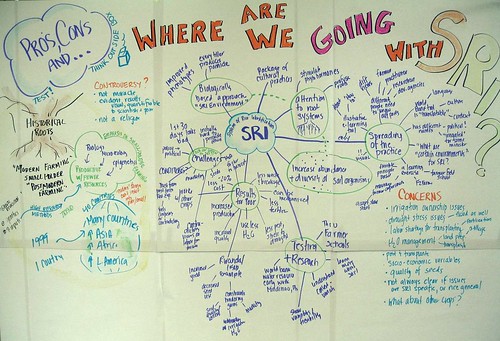
First, the scholars working on SRI were insistent it was not a proscribed method of growing rice that is useful to poor, small holder farmers, but that it was a set of principles for growing rice and other crops.
A set of principles.
Can we view knowledge sharing not as a proscribed set of practices, but instead a set of principles?
While there are a range of tools and methods that we call “knowledge sharing,” they are just tools. And if we overly focus on them, we miss the point that knowledge sharing is embedded in everything we do. Therefore, to make sure we have time for KS and that we do it well and strategically, we might instead focus on the princples that support KS.

So what might those principles be?
Saturday morning, on my way home from Rome at the unnatural hour of 5:15 am, I was surprised to look up in the airport to see a colleague who was at the joint Share Fair in Rome and a past participant of the online KS workshop I have facilitated for FAO and CGIAR. Justin Chisenga of FAO shared the challenges of KS in agriculture in Ghana. He said there were no precedents for sharing agricultural research, but instead a culture of individual ownership, and thus very often loss, of agricultural research knowledge. Locked up in files or personal computers, and unknowingly discarded upon retirement or death, years of knowledge had leaked away. Ownership, not public good.
- What principles could change from lock down to flow in Ghana?
- What principles could encourage funders to reframe their support towards openness and learning?
- What principles could reframe organizational and national policies to support and reward building public instead of private good in fields that ostensibly are dedicated to things like feeding one’s country, region or world?
- What principles could allow people to share knowledge even in large, complex and necessarily political organizations?
My mind returned to what I learned about SRI. SRI focuses attention on the quality of seed, the timing and method of rice seedling transplantation, and THE HEALTH OF THE SOIL and the microorganisms that live there.
What is the soil for knowledge sharing? How do we know it is healthy? What “transplantation” practices allow us to move fragile new knowledge from one place and allow it to thrive in another, without too much loss, or too much investment in water and fertilizer? How should we “weed” to keep information overload from overwhelming us?
The analogy is intriguing me.
Rice tending image from Wikipedia
Sitting here munching on my last bit (oh no!!) of Italian chocolate, it occurs to me that CIARD (the Coherence in Information for Agricultural Research for Development initiative) is working on elucidating just these sorts of principles: http://www.ciard.net It’s also of interest that CIARD was founded by some of these “large, complex and necessarily political” organizations. It intends to advocate for improved access to agricultural research information, and while this group might not be the fastest to move, there would seem to be a good opportunity here for like to impact like.
Thanks for the link, Michael (and pass the chocolate!) Looking at the CIARD site (and the still empty wikis) I will be watching and learning as this group evolves. The challenge of sharing data in development (agriculture and any other sector) is really interesting to me because it has both social, organizational and technical components. Oh, and political components.
Hi Nancy,
The CGIAR knowledge management conference was a memorable event.
What are the chances of hosting one on lathyrism, the crippling disease caused by excessive consumption of grass pea (Lathyrus sativus)?
Cheers
Dirk